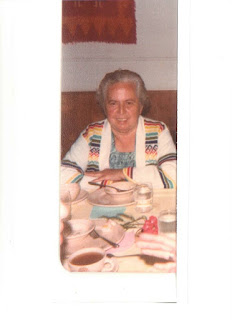Quitaly: At the Scene*
For my history class this last winter semester, I had an assignment to interview someone who had lived through a historical event, and ask them what it was like to live through it. As soon as I learned of the assignment, a widow in my ward came to mind. I thought it would be nice to interview her, but I was a little disappointed.
The woman was eighty years old. She had lived through the near impeachment of a president, the resignation of another, two international wars, a cold war with Russia, a missile crisis, the sending of LDS missionaries to South America, the relinquishment of the priesthood and temple blessings to black members, Civil Right movements, abortion movements, and so much more. I could not wait to pick her brain.
I let her pick the topic. She decided she wanted to talk about 9/11. Now, granted I was six, but even I lived through 9/11. She had so much more exposure to historical events, but only picked the one that everyone already loves to talk about. I could not bare to ask the question: "Where were you on 9/11?" because it sounded so cliche.
She almost held my attention when she said: "We were actually about to go on vacation!"
"So you were at the airport? Which one?" I asked.
They were not at an airport. They never intended to fly to their destination. It was a road trip.
I begged her to change the topic, and I got a near perfect score on my paper on the topic of indoor plumbing.
But it got me thinking: what if I turn out to be like this woman? There are historical events going on all around me but am I really paying attention? I anticipated discussing the Vietnam War with her; I had visited Ho Chi Minh myself just last year. The War Museum there was essentially dedicated to the journalists and all the pictures they took. I felt like a new person leaving that museum, and I saw those pictures forty years too late! I wondered what it was like to see them while the war was going on. This woman was not reading the newspapers at the time, apparently.
I am reading newspapers. I am trying to stay up to date on current events. I limit it to local news so that I do not get overwhelmed. Enough happens in a single city to keep one entertained let alone an entire country.
So I am writing this blog post for my children, their children, and theirs; I want you to know I lived through this and I want you to know what it was like. Your mom/grandma/great-grandma was in the know.
My husband and I came to Italy to start our study abroad/internship in the middle of an Italian government shutdown. It lasted 89 days. The entire country was without a governing body for 89 days. Some members of Congress wanted out of the European Union.
Way back when, Italy used a lira for its currency. Now, it uses the euro just like every other country in the EU. When a bunch of countries are on the same currency, the exchange rate for that currency compared to others can only be as strong as the weakest country. These members of Congress who wanted out wanted Italy to be able to flourish at its own pace.
In the end, Italy stayed in the EU. However, just the thought of Italy, the third largest European economy, quitting had a huge effect on the world. The euro became a lot stronger against the dollar, which is not necessarily a good thing.
Like for us; we became more frugal. With every euro costing more dollars than it did at the beginning of our trip, every euro hurt more to spend. Luckily, by this time we had already found a great place for lunch that had pasta and salads for four euro a plate. We ate only here for more than a week.
Also, through the school we studied Italian with while we were here, we were presented with an anthropology class by one of the best professors here. We would have to pay for the class, but we would receive credit from our university. The school had already decided to charge us in American dollars. By the time tuition was due, the euro was already worth more than the dollar, so the school ended up receiving less euros than they anticipated.
This was lucky for us because they could have charged us the same numerical amount just in euros and it would have cost us significantly more. However, we might not have paid for the class if it was significantly more expensive, so the school might have lost out on students.
"What if"s be darned my husband and I are in an anthropology class in Italy, being taught by an Italian man, all in his native tongue.
There's my report on Quitaly. I am not an economist and I cannot even say I have ever taken an economics course in my life. But I am aware and conscious of the current events happening around me. And I want you, reader, to know that they affected me. That means the current events that happen every day in your neck of the wood affect you too. Just look around.
The woman was eighty years old. She had lived through the near impeachment of a president, the resignation of another, two international wars, a cold war with Russia, a missile crisis, the sending of LDS missionaries to South America, the relinquishment of the priesthood and temple blessings to black members, Civil Right movements, abortion movements, and so much more. I could not wait to pick her brain.
I let her pick the topic. She decided she wanted to talk about 9/11. Now, granted I was six, but even I lived through 9/11. She had so much more exposure to historical events, but only picked the one that everyone already loves to talk about. I could not bare to ask the question: "Where were you on 9/11?" because it sounded so cliche.
She almost held my attention when she said: "We were actually about to go on vacation!"
"So you were at the airport? Which one?" I asked.
They were not at an airport. They never intended to fly to their destination. It was a road trip.
I begged her to change the topic, and I got a near perfect score on my paper on the topic of indoor plumbing.
But it got me thinking: what if I turn out to be like this woman? There are historical events going on all around me but am I really paying attention? I anticipated discussing the Vietnam War with her; I had visited Ho Chi Minh myself just last year. The War Museum there was essentially dedicated to the journalists and all the pictures they took. I felt like a new person leaving that museum, and I saw those pictures forty years too late! I wondered what it was like to see them while the war was going on. This woman was not reading the newspapers at the time, apparently.
I am reading newspapers. I am trying to stay up to date on current events. I limit it to local news so that I do not get overwhelmed. Enough happens in a single city to keep one entertained let alone an entire country.
So I am writing this blog post for my children, their children, and theirs; I want you to know I lived through this and I want you to know what it was like. Your mom/grandma/great-grandma was in the know.
My husband and I came to Italy to start our study abroad/internship in the middle of an Italian government shutdown. It lasted 89 days. The entire country was without a governing body for 89 days. Some members of Congress wanted out of the European Union.
Way back when, Italy used a lira for its currency. Now, it uses the euro just like every other country in the EU. When a bunch of countries are on the same currency, the exchange rate for that currency compared to others can only be as strong as the weakest country. These members of Congress who wanted out wanted Italy to be able to flourish at its own pace.
In the end, Italy stayed in the EU. However, just the thought of Italy, the third largest European economy, quitting had a huge effect on the world. The euro became a lot stronger against the dollar, which is not necessarily a good thing.
Like for us; we became more frugal. With every euro costing more dollars than it did at the beginning of our trip, every euro hurt more to spend. Luckily, by this time we had already found a great place for lunch that had pasta and salads for four euro a plate. We ate only here for more than a week.
Also, through the school we studied Italian with while we were here, we were presented with an anthropology class by one of the best professors here. We would have to pay for the class, but we would receive credit from our university. The school had already decided to charge us in American dollars. By the time tuition was due, the euro was already worth more than the dollar, so the school ended up receiving less euros than they anticipated.
This was lucky for us because they could have charged us the same numerical amount just in euros and it would have cost us significantly more. However, we might not have paid for the class if it was significantly more expensive, so the school might have lost out on students.
"What if"s be darned my husband and I are in an anthropology class in Italy, being taught by an Italian man, all in his native tongue.
There's my report on Quitaly. I am not an economist and I cannot even say I have ever taken an economics course in my life. But I am aware and conscious of the current events happening around me. And I want you, reader, to know that they affected me. That means the current events that happen every day in your neck of the wood affect you too. Just look around.




Comments
Post a Comment